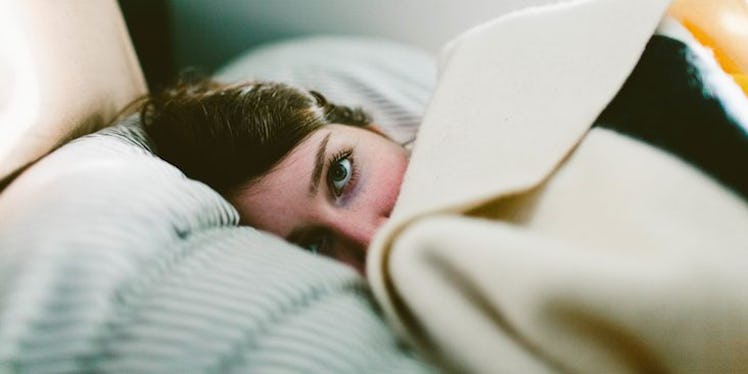
Doing This One Thing Before Bed Can Make Your Stress Dreams Way Worse
It's dark, and you suddenly find yourself being chased down a dark street. Yet, no matter how hard you try, you can't seem to run away -- and then you wake up. You're anxious, and you feel anything but well-rested. This, my friend, is called a stress dream, and you know it when you have one. Themes that often pervade stress dreams include things like embarrassment, being pursued by someone or something unwanted, or falling. But since dreams are often connected to your real life, there might be a very real habit connected to why you're having stress dreams.
While any number of factors in your life -- a hectic week at work, a week full of studying and difficult exams -- can certainly lead you to experience a stress dream, I'm here to tell you it often boils down to one thing, and one thing only: your use of social media.
Yes, if you want a chance at really, truly restful sleep, you might want to step away from Instagram, Facebook, and Twitter when you're getting into bed. Turn the phone on airplane mode, close the laptop, put on that eye mask, and simply sleep.
Scrolling through social media doesn't just disrupt your sleep; it's also proven to generally cause more stress.
A study from the American Psychological Association found that excessive time spent with technology and lingering on social media apps have resulted in people becoming “constant checkers.” On a 10-point stress scale (in which 10 indicates the highest level of stress), people who check social media more often average about a 5.3, while people who check less often average at a 4.4.
Plus, it's worth mentioning here that the research showed those who check work emails (or work-related social media) on their days off ranked at about a 6 on that 10-point stress scale.
So, as you can see, stress is definitely not uncommon. Elite Daily had a chance to speak with dream counselor and coach Dr. Laurel Clark, who emphasizes the point that recurring anxiety dreams are equally as common.
Dreams can give you messages or feedback about what you're doing and how you're thinking.
So, say you're engaging in something stressful or anxiety-provoking, like checking your ex's current SO's Instagram right before you click off the light and go to bed. There's a pretty good chance those negative feelings toward your ex and their new boo will find their way into your dreams, even if abstractly.
Furthermore, your habits on social media are often indicative of what you're worried about, or (not) dealing with in waking life, which affects the way you sleep.
Elite Daily also had a chance to speak with Dr. John Mayer, a clinical psychologist at Doctor On Demand, who provides some great tips for battling anxiety dreams.
Dr. Mayer reminds us that the brain itself is like a computer, and that computer keeps working even when you shut your eyes for the night.
If the "data" you're putting into "your computer" is stressful or is reinforcing something that induces bad feelings, that's what you're going to be working with in your dreams.
So, if you're having anxiety dreams, "you need to replace it with other data, resolve the conflict it represents, or identify that problem," Dr. Mayer explains.
Promoting positive dreams, on the other hand, is all about taking control. He tells Elite Daily,
When you go put your head on the pillow, you can think about something that is immensely pleasurable to you: a great date, some time you felt really good about yourself, or looked beautiful, or had fun. Imagine it fully and in great detail.
Dr. Mayer says that putting "data" in your head that is positive and peaceful helps your mind not to wander into a place of stress or menacing fear.
Plus, you get to spend time thinking about things that make you happy, which in and of itself is a great habit, wouldn't you say?